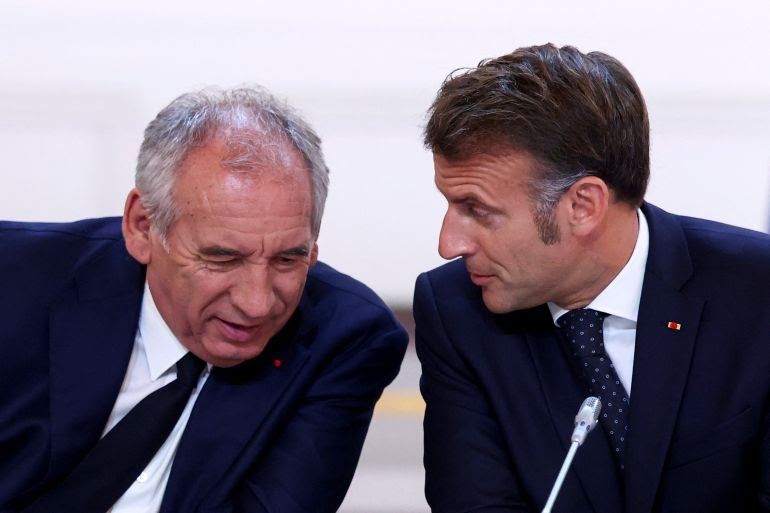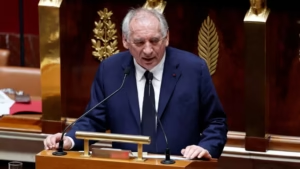
French Government Collapse 2025: Macron, Confidence Vote, Debt Crisis, and France’s Political Problems
- Foreign News
- 08.09.2025
- 1 Comment
- 82
French Government Collapse 2025: Macron, Confidence Vote, Debt Crisis, and France’s Political Problems

crises in recent history. Following a dramatic confidence vote in parliament, Prime Minister François Bayrou was ousted
after losing support from lawmakers. President Emmanuel Macron, still in office, now finds himself grappling
with political instability, mounting national debt, and a restless public. This article explores the timeline of events, the
causes of the collapse, and the broader implications for France and Europe.
French Government Vote: What Happened?
The confidence vote took place on September 2, 2025, in the French National Assembly.
Out of hundreds of lawmakers present, 364 voted against Prime Minister Bayrou, while only 194 supported him.
The threshold to maintain power was 280 votes, making the rejection decisive. The vote was triggered after Bayrou attempted
to push through a controversial €44 billion austerity package, which included freezing public spending and
eliminating two public holidays.
The defeat was not just about fiscal policy but about trust in leadership. Lawmakers across the political
spectrum accused Bayrou of ignoring the will of the people and deepening France’s social and economic inequalities.

French Government Collapse 2025: The Key Reasons
The collapse of the French government was the result of multiple interconnected factors:
- Unpopular Austerity Measures: Bayrou’s savings plan was viewed as punishing ordinary citizens.
- Mounting Public Debt: France’s national debt reached historic levels, worrying investors and voters alike.
- Fractured Parliament: After the 2024 snap election, Macron’s centrist bloc lost its majority, leaving parliament deeply divided.
- Public Anger: French citizens have grown increasingly frustrated with political elites, sparking mass protests.
- Political Fatigue: This was the third prime minister to fall under Macron, weakening confidence in his leadership.
France President: Is Macron Still in Power?
Despite the collapse of Bayrou’s government, Emmanuel Macron remains president of France. His presidential
mandate runs until 2027, meaning he cannot be removed by a parliamentary confidence vote. However, his political influence
has been severely weakened. Macron now faces the challenge of appointing a new prime minister, but any centrist candidate is
likely to face immediate opposition.
Far-right leader Marine Le Pen has demanded that Macron dissolve parliament and call fresh elections,
but doing so could further empower extremist parties and fracture France’s democracy.
French Prime Minister vs President: Understanding the Roles
In France’s semi-presidential system, both the president and prime minister share executive power. The
president is the head of state, overseeing foreign policy and defense, while the prime minister manages domestic policy
and government administration.
However, when the parliament is fractured, as it is today, this balance of power becomes strained. Macron, as president,
cannot easily push his agenda without a supportive prime minister and a cooperative legislature. The repeated collapse of
governments under his watch highlights this tension between the two offices.

French Confidence Vote Date and Timeline
The critical confidence vote took place on September 2, 2025. It followed months of public debates,
protests, and warnings from economists about France’s rising debt. Prior to this, Bayrou had introduced his austerity
plan in July, sparking nationwide demonstrations by unions and civil society groups. By the time of the vote, his
support had collapsed, making his defeat almost inevitable.
Bayrou will formally submit his resignation on September 3, 2025. Macron is expected to announce a new prime minister
within the week.
Is the French Government in Debt?
Yes, France is facing a severe debt crisis. As of mid-2025, public debt exceeded 110% of GDP, one of
the highest levels in the Eurozone. Investors have grown increasingly concerned, with French bond yields surpassing
those of Spain, Portugal, and even Greece countries once at the heart of the European debt crisis.
A potential downgrade by international credit rating agencies threatens to worsen the crisis, making borrowing even
more expensive for the French government. This financial strain was one of the key drivers of Bayrou’s failed austerity push.
What Is the Current Problem in France?
France’s current problems are multi-layered, combining economic hardship, political instability, and social unrest.
Among the most pressing issues are:
- Political Instability: With three prime ministers ousted in less than two years, governance is paralyzed.
- Economic Uncertainty: Rising debt, weak growth, and fears of a downgrade threaten the economy.
- Social Discontent: Mass protests, union strikes, and declining trust in politicians are shaking the system.
- Rise of Extremism: Both far-right and far-left parties are gaining popularity, threatening Macron’s centrist model.
- Geopolitical Pressures: France’s leadership role in Europe is weakened at a time of global crises in Ukraine and the Middle East.
These challenges are not just temporary setbacks. They reveal deeper structural problems within France’s political system
and its economy, fueling fears of long-term instability.
stabilize the economy, and rebuild public trust. However, given the fractured state of French politics,
any new government risks facing immediate resistance.
If Macron calls for a snap election, polls suggest that the far-right National Rally would come out on top,
followed by the left, leaving Macron’s centrist bloc in third place. Such an outcome could permanently reshape France’s
political landscape, raising questions about the country’s future in Europe and the global order.





1 Comments
[…] More News:French Government Collapse 2025: Macron, Confidence Vote, Debt Crisis, and France’s Politi… […]